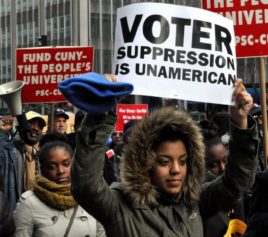A new smartphone app meant to enhance the voting experience of voters nationwide was revealed on Thursday by a committee of civil rights groups. The app, dubbed “Election Protection,” is specifically aimed to defend the interests of voters of color and youth voters who the groups believe are being disenfranchised by new voting laws and regulations.
“The Election Protection smartphone app is a dynamic tool that will educate voters on their rights and empower them to take action so they can vote,” said Barbara Arnwine, executive director of the Lawyers’ Committee for Civil Rights Under Law during a Thursday conference call with the other organizations involved with the application’s development. Arwine went on to describe the free app as a “critical tool in our fight against voter suppression.”
Voters who download the app will be able to digitally verify their registration status, as well as find their nearest polling place, fill out voter registration forms, and contact election protection officials. These are just some of the features included in the app, meant not only to protect voters’ rights, but encourage others to vote as well.
Leading up to the 2012 election, several states have sought to invoke new voter identification laws and other restrictions that civil rights activists have labeled as a new age “Jim Crow,” referring to segregation and discriminatory laws in America’s past. U.S. Attorney General Eric Holder has sided with these groups, condemning voting restrictions such as the ones passed in Texas and Pennsylvania, where the Justice Department has mounted a legal challenge.
Speaking to the NAACP in Houston, Holder said that the Justice Department “will not allow political pretexts to disenfranchise American citizens of their most precious right.” Specifically of the identification laws, Holder said, “Many of those without IDs would have to travel great distances to get them–and some would struggle to pay for the documents they might need to obtain them. We call these poll taxes.”
Such taxes were made illegal by the 24th amendment, but as it stands, the laws will still be in place moving into November. In addition, the new identification laws have been shown to be detrimental to young voters, who face increased confusion over what they need to vote. A survey from Tufts University showed that more than two-thirds of young voters are either unsure or incorrectly informed about their state’s photo ID requirements, and that some 80 percent are misinformed on their state’s registration rules.
The app will certainly be of use to tech-savvy young people, as well as African Americans and Latinos, who have been proven to have a higher rate of smart phone usage than other Americans, despite having lower incomes.


